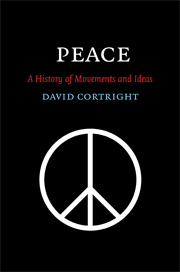14 - A moral equivalent
Published online by Cambridge University Press: 05 June 2012
Summary
The theory of democratic peace was based on the assumption that mass public opinion would be a force for moderation. The citizens of a free country, if given the chance to determine national policy, would naturally prefer peace over war. History quickly disproved that belief. As nations became more democratic they did not necessarily become more peaceful. Democratic states developed peaceful relations with one another, but they showed a very different, more bellicose face toward less democratic countries. The assumption that free people would naturally reject war was sadly mistaken. Support for war was no less virulent among the so-called industrious classes than among kings and nobles. The socialist creed of labor internationalism proved to be just as illusory. Most of those who cheered the call to solidarity of Jaurès in 1912 enthusiastically marched off to kill their fellow workers in 1914.
In the nineteenth and twentieth centuries the rise of democracy was linked to nationalism and the demand for self-determination. As ethnic and linguistic communities rebelled against colonialism and external control, they identified themselves as nations. They were no longer willing to accept constraints that suppressed their economic, cultural, and political rights. The demand for self-rule inevitably challenged the existing political order and often led to armed conflict. Many of the most ardent advocates of peace in nineteenth-century Europe were supporters of national liberation. They strongly sympathized with the democratic movements struggling against the Hapsburg, Ottoman, and Russian empires.
- Type
- Chapter
- Information
- PeaceA History of Movements and Ideas, pp. 302 - 320Publisher: Cambridge University PressPrint publication year: 2008

